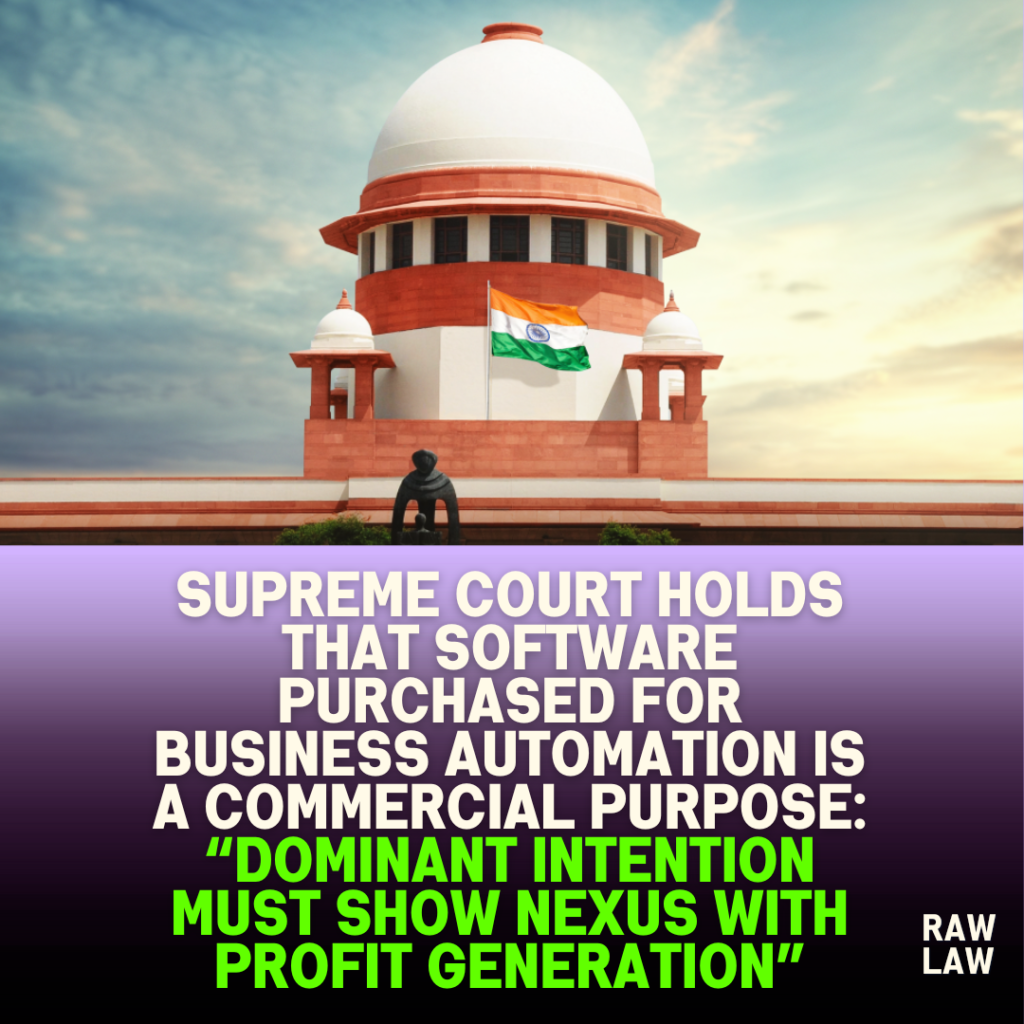Court’s decision
The Supreme Court dismissed the appeal, upholding concurrent findings of the State Commission and the National Commission that the buyer of the software did not qualify as a “consumer” under Section 2(1)(d) of the Consumer Protection Act, 1986. The Court held that the software was purchased for business automation directly connected to profit-generation and therefore amounted to a commercial purpose, which excludes the purchaser from the definition of a consumer. The Court also emphasised that the “dominant purpose test” governs the determination of commercial purpose.
Facts
Supreme Court’s Clarification on Commercial Purpose
The appellant, a registered company engaged in export and import of medical devices, sought to install an export-import documentation system. For this purpose, it purchased a software licence of a specialised suite designed to assist with export documentation, tracking consignments, handling duty drawbacks, and managing foreign exchange-related processes. After making full payment, the buyer alleged that the software malfunctioned and did not perform as promised. On this basis, a consumer complaint was filed seeking refund of licence fee, development cost, and interest. The respondent raised a preliminary objection that the buyer was not a consumer since the purchase was for a commercial purpose.
Issues
The central legal question was whether the purchase of specialised software for automating business operations of a commercial entity constitutes a “commercial purpose” under Section 2(1)(d) of the Consumer Protection Act, thereby excluding the purchaser from the definition of a “consumer.” Additionally, the Court had to examine whether the explanation relating to earning livelihood through self-employment applied to a corporate entity purchasing software for internal use.
Petitioner’s arguments
The petitioner argued that the software was purchased for internal use as an end-user with no intention of resale or profit-making directly from the software itself. It contended that the transaction was merely to facilitate functioning and not aimed at commercial exploitation. It relied on precedents emphasising that identity of purchaser or transaction value is not decisive; rather the dominant purpose must guide the interpretation. It submitted that purchase for operational convenience does not equate to commercial purpose and therefore the buyer must be regarded as a consumer.
Respondent’s arguments
The respondent submitted that the software was integrated with the buyer’s export-import operations and directly contributed to profit-generating activity by automating documentation, tracking consignments, and availing government incentives. It argued that the suite was tailored exclusively for business and was not intended for self-employment or livelihood generation. It further contended that allowing such business-to-business disputes under consumer law would distort the purpose of the legislation. The respondent relied upon judgments where goods procured for commercial enhancement of business efficiency were held outside the ambit of consumer protection.
Analysis of the law
The Court carefully examined Section 2(1)(d) and its explanation. It reiterated that while the definition of “person” includes companies, the relevant determinant is whether the purchase is for commercial purpose. The Court held that software used for automating export-import processes has a direct nexus with generating and augmenting profits. The explanation carved out for livelihood through self-employment applies only to individual or personal use and cannot extend to incorporated business entities conducting full-fledged commercial operations. The Court differentiated between goods purchased for comfort and goods used for operations directly impacting profit.
Precedent analysis
Lilavati Kirtilal Mehta Medical Trust
The Court relied on the principles extracted in this decision to emphasise that dominant purpose and profit nexus are determinative. The judgment clarified that value or identity is irrelevant unless dominant intention shows linkage to commercial gain.
Sunil Kohli v. Purearth Infrastructure
Distinguished because it involved individuals booking premises for personal self-employment. Here, the buyer was a company automating operations for profit.
Harsolia Motors
The Court clarified that insurance for indemnification is not a commercial purpose since it does not directly generate profit. In contrast, software automation was intrinsically profit-linked.
Virender Singh
Applied to reiterate that business expansion using machinery or systems through employees cannot fall within self-employment exception.
Court’s reasoning
The Court concluded that the software was not acquired to earn livelihood through self-employment. Instead, it was procured to enhance efficiency, reduce costs and increase profitability—classic elements of commercial purpose. The Court stressed the distinction between corporate entities and individuals: companies aim to maximise profit, not to earn livelihood. The Court held that automation intended to augment commercial efficiency directly establishes a profit nexus, thereby excluding the purchaser from consumer protection. The Court reaffirmed that each case must be judged on its facts but the transaction here clearly met the threshold of commercial purpose.
Conclusion
The appeal was dismissed. The Supreme Court affirmed that goods or services purchased for automating business operations, when they bear a direct nexus with profit-making, fall under the category of commercial purpose. Corporate purchasers cannot invoke the self-employment explanation meant for individual livelihood. Therefore, the complaint was not maintainable under consumer law.
Implications
This judgment reinforces that business automation tools—including software, machines, and digital systems—are commercial purchases excluded from consumer protection remedies. It strengthens the principle that corporate entities cannot expand the boundaries of consumer jurisdiction for business-to-business disputes. The ruling clarifies the scope of the self-employment exception and ensures statutory integrity by preserving consumer forums for genuine consumer grievances rather than commercial conflicts.



